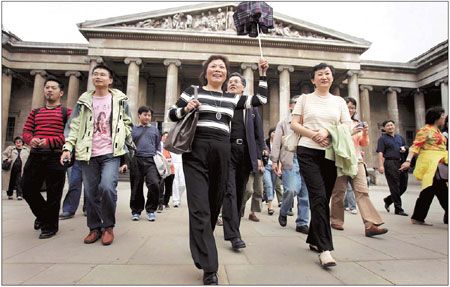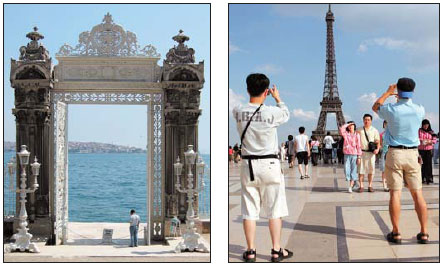Tips and Articles
China's travel revolution
Updated: 2011-01-02 09:47
By Pauline D Loh (China Daily)
|
A Chinese tour group makes a triumphant exit from the British Museum in London. Photos Provided to China Daily |
|
Chinese travelers eager to see the world are visiting both the traditional destinations and countries off the beaten tourist track. |
Pauline D Loh looks back at emerging travel trends and forecasts future destinations likely to attract the Chinese as they continue to explore the world.
Travelers are often divided into tribes in China. There is the beibao zu, backpack tribe, the genban zu, latest-destinations trend lemmings, the ziyouxing zu, the FIT tribe and the Gucci zu, the sybaritic shopping group after the best luxury goods money can buy. In between these elite strata, you also get huge fillers of eager first-time tourists happy to just join a tour and enjoy the novel experience of taking a plane or train for the first time.
The face of the Chinese tourist at home and abroad is changing.
Gone are the wide-eyed, wondrous travelers clutching their first passport stamped with a precious visa finally obtained after weeks of tedious paperwork and patient queuing at the relevant embassy.
Almost gone are super-suspicious immigration officers who treat all Chinese passports as proof of espionage or attempted illegal entry. True, there are some countries still in the dark ages, but most civilized nations now recognize the little maroon book as potential dollars for the local tourism industry.
In 30 years, the changes have been directly in tandem with the economic spurts that has pushed the poverty line in China down 30 percent from 1978 to 2008 - according to a UN 10-year survey.
There is a lot of catching up to do and the Chinese have hurdled across the time warp with characteristic determination.
Witness this: A certain haute couture boutique at Hong Kong's Tsim Sha Tsui closes its doors to cater exclusively for coach loads of mainland tourists, who emerge hours later with a cache of designer bags like they were so much bargain basement goods.
Compare this scenario to just 10 years ago when the same sales staff would have alerted security if a similar busload had flooded the store.
Or look at the proliferation of up-market malls in the SAR's New Territories, populated previously by cows and farmers until about a decade and a half ago when the nearby border gates to Shenzhen and Guangzhou loosened to allow trainloads of shoppers to cross over on weekend shopping frenzies.
Across Taiwan, the mainland tourist floodgates, too, have opened and will be nigh impossible to shut, no matter what changes the political landscape may bring. The Chinese, no matter which side of the Straits they are on, are inexorably linked by commerce, the ancient lifeline that has kept blood thicker than water.
In Singapore, Sydney, Seattle - stop at any traffic junction and wait for the lights to change and the dulcet tones of Chinese conversation filtering through the noise of traffic are very likely to be mainland accented.
In the next 10 years, the decade of the Chinese traveler will have arrived and the third working language worldwide may well be Chinese, if savvy operators know which side their bread is to be lavishly buttered. The rise of the yuan as a world currency will also be an important push.
For Chinese who love to travel, the choices are limitless and restricted only by visa requirements and the number of holidays they can afford to take off work.
More and more have already completed the de rigueur 14-day America east to west coast tour, the 8-country European odyssey, the Sydney-Canberra-Melbourne route and the Vancouver to Toronto trek.
Like the rest of the well-traveled elite of the world, they may opt for lifestyle travel - holidays that offer them retreat, respite and refreshment before they go right back to the money-making machinery.
Destinations off the beaten track will appeal more and more - an island-hopping cruise in Fiji, perhaps, a second honeymoon on the beaches of Boracay, a few days of pampering at the spas in
hiangmai, diving off the Great Barrier Reef in Australia's Gold Coast or game fishing in the Bay of Islands in New Zealand.
More and more, too, will be visiting wine countries in Australia's Margaret River, Barossa and Yarra. They will sample vineyard cuisine in Chile, or South Africa, or France and take cooking lessons in a chalet in Tuscany and or a castle in Scotland.
The world's best resort brands will become familiar in the Chinese market, with many already shifting their focus towards Asia's largest group of consumers.
Within China, there is plenty to offer the domestic traveler. There are 40 UNESCO World Heritage Cultural and Natural Sites. Another 60 to 70 are in the wings waiting to be put on the list.
It is a catalog any self-respecting traveler would want to keep an eye on, especially Chinese tourists who take pride in re-discovering their own country's rich cultural and natural heritage.
The travel landscape in city and country has changed. From Lhasa to Lijiang and Xiamen to Xinjiang, hostels for backpackers now rub shoulders with world-class resorts, boutique hotels and designer spas.
Planes, trains and automobiles, too, are entering a new age. The high-speed trains that link or promise to link China's urban hubs are making land travel faster and more comfortable. In the next decade, all major destinations will be within reach in 8 hours from Beijing.
China's super highways are the envy of many other countries and constantly surprise visitors with their efficiency and excellent maintenance. The congestion is there, of course, but China is hunkering down and looking for solutions, which include an innovative straddle bus that will make its debut before another year is out.
The Middle Kingdom used to look inwards, but now its sons and daughters are making up for lost time - and the world better be prepared.
Specials

President Hu visits the US
President Hu Jintao is on a state visit to the US from Jan 18 to 21.

Ancient life
The discovery of the fossile of a female pterosaur nicknamed as Mrs T and her un-laid egg are shedding new light on ancient mysteries.

Economic Figures
China's GDP growth jumped 10.3 percent year-on-year in 2010, boosted by a faster-than-expected 9.8 percent expansion in the fourth quarter.

